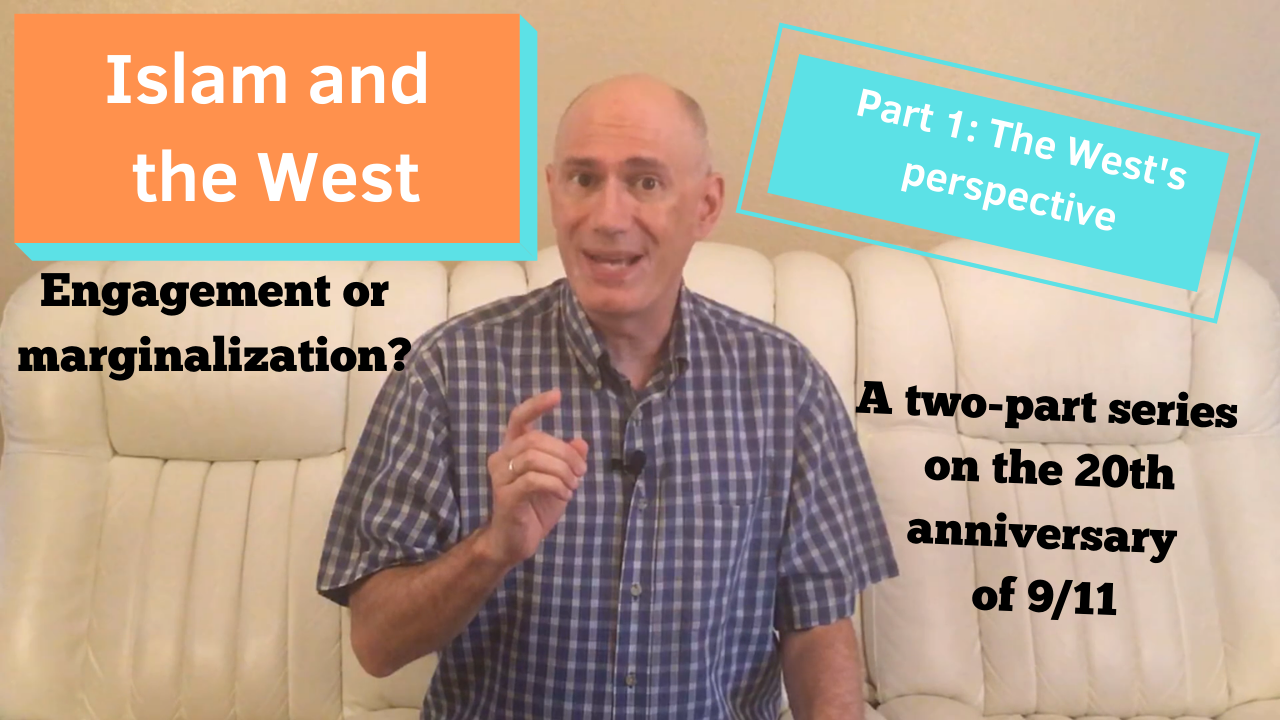09/11/2021 – Islam and the West Part 1

Why is there all this misunderstanding between Islam and the West? Well, there’s reasons for it. Join me in the first of this special two-part 9/11 edition. This is TenOnReligion.
Hey peeps, it’s Dr. B. with TenOnReligion. This video is closed-captioned here on YouTube and the transcript is available at TenOnReligion.com. This is a special two-part edition of TenOnReligion on the 20th anniversary of 9/11. Not many religion YouTubers attempt a video on the perspectives between Islam and the West, but I thought this was a good opportunity to wade into the deep end of the pool here and try to explain what’s going on. By the way, if you like religious studies content go ahead and smash that sub button and share because it really helps out the channel. Okay, one huge thing to keep in mind here is that the both the term and the idea of Islam mean a lot of different things to a lot a different people and that’s one of the reasons why there’s a lot of misunderstanding. And that was a lot of “lots.” So, here’s how this is going to work. This first episode is going to focus more on the West’s side of the equation using the ideas of the Islamic scholar and author, Tarek Osman. The second episode is going to focus on detailing some Islamic perspectives using the ideas of the Islamic scholar and author, John Esposito from Georgetown University. Let’s dive in.
This first episode is based on Tarek Osman’s 2017 book, Islamism: What It Means for the Middle East and the World. Let’s get into some background. In their tense confrontation with Western powers in the 1960’s and 70’s, many Arab nationalist regimes tried to discredit their liberal opposition as tools of the West, agents ‘acting from within’ to disrupt the ‘Arab people’s cohesiveness behind their leaders.’ This demonization was not particularly difficult because, for many Arabs, the notion of ‘liberalism’ carried mixed connotations. Ideas such as the necessity of having multi-party democracies, respecting pluralism, ensuring freedom of expression, and opening up to the world (especially the West) aroused suspicion. Globally, throughout the period from the 1950’s to the 1970’s, the Arab world’s central struggles were against Western imperialism and in the Arab-Israel wars. Ensuring pluralism, protecting and respecting political and human rights, and many other democratic features came to be seen by large sections of Arab society as ‘Western demands,’ instructions issued by the condescending West, or seemingly harmless terms that hid ‘malicious schemes by the West’ to destabilize the Arab world. The Arab regimes, many of which had anchored their legitimacy in the fight against colonialism, differentiated between ‘cultural liberalism’ (which they favored) and ‘political liberalism’ (which they demonized). The distinction went further. While the regimes became the guardians of cultural liberalism, the opponents (in many cases, the ‘liberals’) became the ‘agents’ working with the ‘enemies’ to weaken ‘us.’ Osman then describes what he sees as two dominant positions on how the West views Islam in the Middle East.
In the first view, Islam goes beyond being a faith system because at its core it is a social and political framework. Separating Islam from Islamism is an absolute must for the Islamic world. At some point in the future, the Islamic world will leave Islamism behind, retaining only Islam as a religion. Islamists who use Islam in name only just for political purposes will not ultimately succeed because their societies will move beyond the need to combine a religious frame of reference with domestic politics. Their societies will come to see that Islamization is not the answer to their social and economic questions. They will recognize that this Islamism inhibits social progress, and so will ultimately throw the Islamists out of power. According to Osman, this first perspective encourages engagement with the Islamic world and the Islamists.
In the second view that Osman describes on how the West views Middle Eastern Islam, any separation of Islamism from Islam negates the nature of Islam. Thus, it would ultimately be rejected by the majority of Muslims. Since ‘they will never be like us,’ the West ought to see the Islamic world through ‘our historical experience with it.’ Islam, here, becomes ‘the other,’ which for centuries was ‘the enemy.’ Political Islamists could develop their thinking and operations to win elections and ascend to power. They could change their rhetoric to deceive the elite of their societies, who have become ‘like us.’ Their Islamism has not evolved, because it is incapable of evolving. Islamism here is not a stage in a long socio-political journey: it is an obstacle to the development of these societies. But because it is intertwined with Islam itself, the barrier is so entrenched that it is extremely difficult to remove. The conclusion is that Western-style liberal democracy is doomed to fail in the Arab and Islamic worlds for the foreseeable future. According to Osman, this second perspective distances the West from the Islamic world and is content to see Islamism marginalized or persecuted. It sees it not just as a symptom of the Islamic world’s lagging behind, but as the essence of the danger that that world poses to the West.
These are the two views that Osman describes regarding the Western perspective. He then argues that both views are condescending. They have failed in the key moments when the West has had to engage with the implications of Islamism, and they will continue to create Arab and Islamic enemies for the West. Crucially, both are Western-centric. Despite their different interpretations and policy implications, they look at Islamism through the prism of the West’s own historical experience; they analyze it from within the West’s current value system; and they devise policies towards it to lead to results that the West deems agreeable. But Western-centric perspectives fail to see the bigger picture: that Islamism cannot be understood solely through an assessment of the ‘nature’ of Islam; nor can it be understood through a comparative analysis of the historical paths of Middle Eastern and European societies; and lastly, it cannot be understood by focusing only on the ways of thinking and means of operating of the Islamists themselves.
So, Osman says, the choice will be either to look back to the ‘tenets of the rational religion’ and try to merge them with modernity, along with openness to change and highly flexible understandings of what an Islamic frame of reference means; or to look back in anger, reject modernity, see secularism as a threat destroying Islamic heritage, and insist on a combative Islamism that repudiates the ‘other.’ This latter path of modernity rejection will confirm and strengthen the struggle mindset. Here, many Islamists will embrace and espouse ‘jihad’ in its broader self-definition: self-exertion for a higher cause. Some will hold the idea that Islamism is fighting the ‘enemies of Islam’ – be they ‘infidel Westerners,’ corrupt elites, or secular Muslims.
The wildcard is the Arab secularists who are within the economically powerful upper-middle classes in the large and culturally influential Arab countries. The question here will be whether these Arab secularists accept the Islamists, demand their inclusion in their countries’ political systems, and realize that exclusion and demonization make the social polarization worse.
Wow, there’s a lot of stuff to think about there in Osman’s ideas. Leave a comment, or two, and let me know what you think. What did you think about Tarek Osman’s ideas on the two perspectives he described about the West’s view of Islam in the Middle East? It just seems like there’s a lot of misunderstanding on both sides, but with so many perspectives on both sides, it’s just challenging to reconcile this.
Check out the next episode where we’re going to shift to some Islamic perspectives using the ideas of the Islamic scholar and author, John Esposito, specifically his 2005 book, Islam: The Straight Path. Esposito differentiates between Islamic revivalists and radical activists and also describes four orientations towards change in Islam. I hope I was able to help you understand some of the big picture surrounding Islam and the West. Until next time, stay curious. If you enjoyed this, please like and share this video and subscribe to this channel. This is TenOnReligion.


